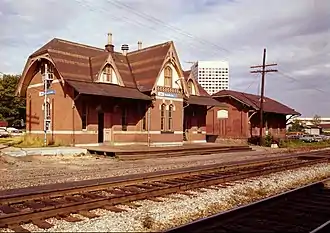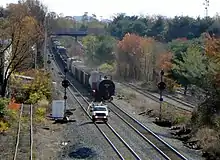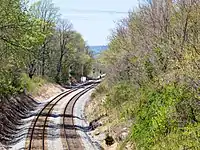Metropolitan Subdivision
The Metropolitan Subdivision is a railroad line owned and operated by CSX Transportation in the District of Columbia and the U.S. state of Maryland. The line runs from Washington, D.C., northwest to Weverton, Maryland, along the former Metropolitan Branch of the Baltimore and Ohio Railroad.[1][2]
.jpg.webp)
Metropolitan Subdivision | |||||||||||||||||||||||||||||||||||||||||||||||||||||||||||||||||||||||||||||||||||||||||||||||||||||||||||||||||||||||||||||||||||||||||||||||||||||||||||||||||||||||||||||||||||||||||||||||||||||||||||||||||||||||||||||||||||||||||||||||||||||||||||||||||||||||||||||||||||||||||||||||||||||||||||||||||||||||||||||||||||||||||||||||||||||||
|---|---|---|---|---|---|---|---|---|---|---|---|---|---|---|---|---|---|---|---|---|---|---|---|---|---|---|---|---|---|---|---|---|---|---|---|---|---|---|---|---|---|---|---|---|---|---|---|---|---|---|---|---|---|---|---|---|---|---|---|---|---|---|---|---|---|---|---|---|---|---|---|---|---|---|---|---|---|---|---|---|---|---|---|---|---|---|---|---|---|---|---|---|---|---|---|---|---|---|---|---|---|---|---|---|---|---|---|---|---|---|---|---|---|---|---|---|---|---|---|---|---|---|---|---|---|---|---|---|---|---|---|---|---|---|---|---|---|---|---|---|---|---|---|---|---|---|---|---|---|---|---|---|---|---|---|---|---|---|---|---|---|---|---|---|---|---|---|---|---|---|---|---|---|---|---|---|---|---|---|---|---|---|---|---|---|---|---|---|---|---|---|---|---|---|---|---|---|---|---|---|---|---|---|---|---|---|---|---|---|---|---|---|---|---|---|---|---|---|---|---|---|---|---|---|---|---|---|---|---|---|---|---|---|---|---|---|---|---|---|---|---|---|---|---|---|---|---|---|---|---|---|---|---|---|---|---|---|---|---|---|---|---|---|---|---|---|---|---|---|---|---|---|---|---|---|---|---|---|---|---|---|---|---|---|---|---|---|---|---|---|---|---|---|---|---|---|---|---|---|---|---|---|---|---|---|---|---|---|---|---|---|---|---|---|---|---|---|---|---|---|---|---|---|---|---|---|---|---|---|---|---|---|---|---|---|---|---|---|---|---|---|---|---|
| |||||||||||||||||||||||||||||||||||||||||||||||||||||||||||||||||||||||||||||||||||||||||||||||||||||||||||||||||||||||||||||||||||||||||||||||||||||||||||||||||||||||||||||||||||||||||||||||||||||||||||||||||||||||||||||||||||||||||||||||||||||||||||||||||||||||||||||||||||||||||||||||||||||||||||||||||||||||||||||||||||||||||||||||||||||||

Metropolitan Branch | ||||||||||||||||||||||||||||||||||||||||||||||||||||||||||||||||||||||||||||||||||||||||||||||||||||||||||||||||||||||||||||||||||||||||||||||||||||||||||||||||||||||||||||||||||||||||||||||||||||||||||||||||||||||||||||||||||||||||||||||||||||||||||||||||||||||||||||||||||||||||||||||||||||||||||||||||||||||||||||||||||||||||||||||||||||
|---|---|---|---|---|---|---|---|---|---|---|---|---|---|---|---|---|---|---|---|---|---|---|---|---|---|---|---|---|---|---|---|---|---|---|---|---|---|---|---|---|---|---|---|---|---|---|---|---|---|---|---|---|---|---|---|---|---|---|---|---|---|---|---|---|---|---|---|---|---|---|---|---|---|---|---|---|---|---|---|---|---|---|---|---|---|---|---|---|---|---|---|---|---|---|---|---|---|---|---|---|---|---|---|---|---|---|---|---|---|---|---|---|---|---|---|---|---|---|---|---|---|---|---|---|---|---|---|---|---|---|---|---|---|---|---|---|---|---|---|---|---|---|---|---|---|---|---|---|---|---|---|---|---|---|---|---|---|---|---|---|---|---|---|---|---|---|---|---|---|---|---|---|---|---|---|---|---|---|---|---|---|---|---|---|---|---|---|---|---|---|---|---|---|---|---|---|---|---|---|---|---|---|---|---|---|---|---|---|---|---|---|---|---|---|---|---|---|---|---|---|---|---|---|---|---|---|---|---|---|---|---|---|---|---|---|---|---|---|---|---|---|---|---|---|---|---|---|---|---|---|---|---|---|---|---|---|---|---|---|---|---|---|---|---|---|---|---|---|---|---|---|---|---|---|---|---|---|---|---|---|---|---|---|---|---|---|---|---|---|---|---|---|---|---|---|---|---|---|---|---|---|---|---|---|---|---|---|---|---|---|---|---|---|---|---|---|---|---|---|---|---|---|---|---|---|---|---|---|---|---|---|---|---|---|---|---|---|---|---|---|
1893 | ||||||||||||||||||||||||||||||||||||||||||||||||||||||||||||||||||||||||||||||||||||||||||||||||||||||||||||||||||||||||||||||||||||||||||||||||||||||||||||||||||||||||||||||||||||||||||||||||||||||||||||||||||||||||||||||||||||||||||||||||||||||||||||||||||||||||||||||||||||||||||||||||||||||||||||||||||||||||||||||||||||||||||||||||||||
| ||||||||||||||||||||||||||||||||||||||||||||||||||||||||||||||||||||||||||||||||||||||||||||||||||||||||||||||||||||||||||||||||||||||||||||||||||||||||||||||||||||||||||||||||||||||||||||||||||||||||||||||||||||||||||||||||||||||||||||||||||||||||||||||||||||||||||||||||||||||||||||||||||||||||||||||||||||||||||||||||||||||||||||||||||||
At its southeast end, north of Union Station, the Metropolitan Subdivision meets the Capital Subdivision (formerly called the B&O Washington Branch) and Amtrak's Northeast Corridor. It meets the Old Main Line Subdivision at Point of Rocks, Maryland. At its northwest end in Weverton, the line joins the Cumberland Subdivision.
MARC Train's Brunswick Line uses the entire subdivision, as does Amtrak's Capitol Limited. The Red Line of the Washington Metro shares right-of-way with the subdivision along two separate stretches in Maryland and D.C.: from the junction with the Capital Subdivision to north of Silver Spring, and from south of Twinbrook to the end of the Red Line at Shady Grove.
History
Interest in building a new rail line from Washington to points west was initially generated by businessmen in Washington and Montgomery County, Maryland.[3] In 1853 they obtained a corporate charter from the Maryland General Assembly to form the Metropolitan Railroad.[4] The proposed line would run from Washington to the vicinity of Frederick, Maryland, where it would connect with the B&O main line, and continue to Hagerstown, Maryland. The company conducted some initial land surveys, but had difficulty raising funds and went bankrupt in 1863.[3] Previously the B&O had not been interested in building a new route out of Washington, but following the Metropolitan Railroad's failure, it took over the expired charter in 1865. Construction began in 1866 along a slightly different route, connecting with the main line at Point of Rocks, Maryland.[5]:164 The line opened in 1873 as the B&O's Metropolitan Branch.[6]:7
Upon the opening of the branch on April 30, 1873,[7] the B&O rerouted its through passenger traffic through Washington, and the Old Main Line, from Point of Rocks to Relay, was reduced to secondary status as far as passenger service was concerned. Some through freight trains were also rerouted to use the new line.[8]
Due to increasing congestion, the B&O began to add double track portions to the line in 1886. The Washington-to-Gaithersburg section was double-tracked by 1893.[5]:166 During the peak years of passenger operation, 1893 to the 1920s, there were eighteen trains per day, with as many as 28 stops along the Met Branch.[6]:7
Significant engineering features include bridges across:
- Tuscarora Creek. Originally a Bollman truss iron bridge, replaced with a girder bridge in 1904.
- Monocacy River. Originally a 700-foot-long (210 m) Bollman truss, replaced with a seven-span girder bridge in 1904.
- Little Monocacy River. Originally a 500-foot wood trestle, replaced by a 331-foot stone arch viaduct in 1906.
- Great Seneca Creek (Waring Viaduct). Originally a 400-foot-long (120 m) wood and iron trestle, replaced with an arch stone viaduct in 1906.
- Little Seneca Creek. Originally a timber bridge, replaced with a steel trestle in 1896, and then a concrete arch in 1928.
- Rock Creek. Originally four 100-ft Bollman trusses, it was replaced by a stone arch bridge in 1896.
Double-tracking was completed on the remainder of the branch in 1928. Several distinctive passenger stations, designed by architect Ephraim Francis Baldwin, were constructed along the line. Original stations still stand at Rockville (moved away from the tracks in 1981), Kensington, Gaithersburg, Dickerson, and Point of Rocks.[6]:6–10
In 1906, a rear collision at Terra Cotta station killed 53 people.
Georgetown Branch
The Georgetown Branch ran from a junction north of the Silver Spring station to the Georgetown area of Washington, D.C. The branch was built between 1892 and 1910. It was originally intended to be a B&O extension that would cross the Potomac River near the Chain Bridge. In 1904 the B&O reached agreement with the Pennsylvania Railroad to access the nearby Long Bridge over the Potomac, and then proceeded to use the Georgetown Branch as a spur servicing local industries in Silver Spring, Chevy Chase, Bethesda and Georgetown.[6]:27–29 Significant engineering features that were built on the branch included the Rock Creek Trestle in Chevy Chase, the Dalecarlia Tunnel and a through-truss bridge over the Chesapeake and Ohio Canal.
CSX abandoned the Georgetown Branch in 1986, with the last train running in June 1985, and the spur is now accessible to the public as the Capital Crescent Trail. The Bethesda-to-Silver Spring portion of the spur is also providing a right-of-way for the Purple Line light rail system, which has been under construction since 2017.[9] The existing Rock Creek trestle was demolished and is being replaced by new bridges to support the light rail tracks and the bicycle trail.[10]
Current operation

Through mergers, the line became part of the CSX system in 1987. CSX organized its Metropolitan Subdivision as a combination of the original B&O Met Branch plus a section of the B&O original main line northwest of Point of Rocks, which had opened in 1834. The entire subdivision is signaled for bi-directional running. There is a spur that services the Dickerson Generating Station (formerly owned by the Potomac Electric Power Company (PEPCO)) at Dickerson, and a trash-transfer facility spur at Derwood. The interlockings on the line are (east to west): F Tower, QN Tower, Georgetown Jct, Montrose, Derwood, Cloppers, Buck Lodge, Dickerson, PEPCO, Tuscarora, East Rocks, Point of Rocks, East Brunswick, WB Tower and Weverton.[1]

See also
References
- CSX Transportation. "Northern Region, Baltimore Division, Timetable No. 4." Archived 2011-03-22 at the Wayback Machine Effective 2005-01-01.
- http://wiki.radioreference.com/index.php/ME-Metropolitan_Sub
- "The Metropolitan Line of the B&O Railroad". Montgomery County Historical Society. Retrieved 2017-06-18.
- U.S. Congress. House of Representatives. Committee on the District of Columbia (1860). Report on the Memorial of the Directors of the Metropolitan Railroad Company made by the Hon. G.W. Hughes, of Maryland (Report).
- Harwood Jr., Herbert H. (1994). Impossible Challenge II: Baltimore to Washington and Harpers Ferry from 1828 to 1994. Baltimore: Barnard, Roberts. ISBN 0-934118-22-1.
- Soderberg, Susan C. (1998). "The Met: A History of the Metropolitan Branch of the B&O Railroad, Its Stations and Towns". Germantown, MD: Germantown Historical Society. Cite journal requires
|journal=(help) - "The Metropolitan Railroad" (PDF). The Evening Star. Washington, D.C. April 30, 1873. p. 4.
- "PRR Chronology, 1873" (PDF). (100 KiB), February 2004 Edition
- Shaver, Katherine (2020-05-01). "Firms building Maryland Purple Line say they plan to quit the job over disputes with the state". The Washington Post.
- "Chapter 5.0. Overview of Construction Activities". Purple Line Final Environmental Impact Statement and Draft Section 4(f) Evaluation (Report). Baltimore, MD: Maryland Transit Administration. August 2013. p. 5-3.
External links
| Wikimedia Commons has media related to Metropolitan Subdivision. |
- The Georgetown Branch - History and photos